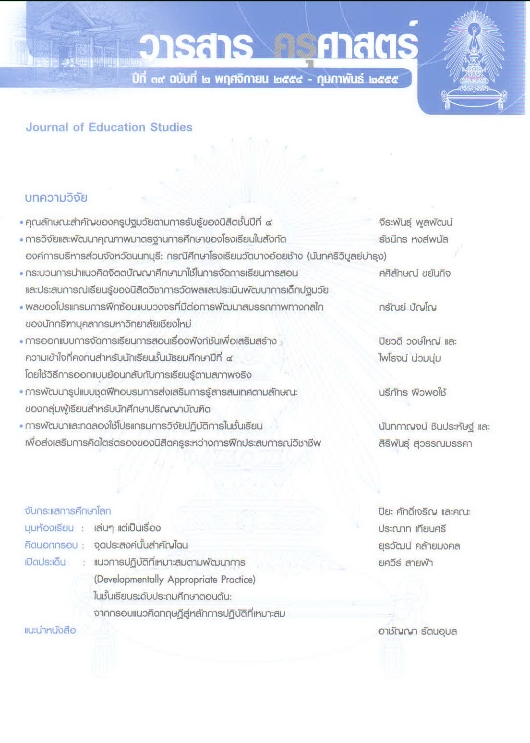กระบวนการนำแนวคิดจิตตปัญญาศึกษามาใช้ในการจัด การเรียนการสอนและประสบการณ์เรียนรู้ของนิสิตวิชาการ วัดผลและประเมินพัฒนาการเด็กปฐมวัย
Abstract
วัตถุประสงค์ของการวิจัยเพื่อ ๑) ศึกษากระบวนการนำแนวคิดจิตตปัญญาศึกษามาใช้ในการ จัดการเรียนการสอนรายวิชาการวัดผลและประเมินพัฒนาการเด็กปฐมวัย สำหรับนิสิตระดับปริญญาโท และ ๒) ศึกษาประสบการณ์การเรียนรู้ของนิสิตในด้านการตระหนักรู้ต่อตนเอง ผู้อื่น และวิชาชีพ บริบทของการวิจัยเป็นชั้นเรียนรายวิชาการวัดผลและประเมินพัฒนาการเด็กปฐมวัย ที่เปิดสอนในภาค การศึกษาปลาย ปีการศึกษา ๒๕๕๑ สำหรับนิสิตปริญญาโท ภาคนอกเวลาราชการ จำนวน ๓๒ คน เก็บ ข้อมูลด้วยการสังเกตแบบมีส่วนร่วมในชั้นเรียน การดึงข้อมูลจากบันทึกสะท้อนการเรียนรู้ของนิสิต และ การสัมภาษณ์กลุ่มย่อย วิเคราะห์ข้อมูลโดยใช้การวิเคราะห์เนื้อหาและการจัดระบบข้อมูลตามวิธีการ แบบอุปนัยกระบวนการนำแนวคิดจิตตปัญญาศึกษามาใช้ในการจัดการเรียนการสอนรายวิชาการวัดผล และประเมินพัฒนาการเด็กปฐมวัยประกอบด้วย ๓ ขั้นตอน ได้แก่ ๑) การเตรียมการ ประกอบด้วย การเตรียมชีวิตและการเตรียมวิชา ๒) การจัดการเรียนการสอน เป็นการดำเนินการภายใต้บรรยากาศ ของชุมชนแห่งการเรียนรู้ โดยให้ผู้เรียนได้เรียนรู้ผ่านประสบการณ์ และ ๓) การประเมินผลการเรียนรู้ เป็นการประเมินผลการเรียนรู้ที่ครอบคลุมองค์ความรู้ทั้ง ๓ ภาค คือ ภาคจิตวิญญาณ ภาควิชาชีพครู ปฐมวัย และภาควิชาการ ประสบการณ์เรียนรู้ที่เกิดขึ้นสามารถสรุปเป็นประเด็นการตระหนักรู้ต่อ ตนเอง ต่อผู้อื่น และต่อวิชาชีพ ดังนี้ ๑) การตระหนักรู้ต่อตนเอง ได้แก่ การเข้าใจตนเอง การรู้เท่าทัน ตนเอง การปล่อยวาง ไม่ตัดสิน การเปิดใจกว้าง การเห็นคุณค่าในตนเอง การพัฒนาตนเอง การสังเกต ที่ละเอียดลออ การมองโลกในแง่ดีและมีความสุข การเรียนรู้ที่มีประสิทธิภาพ ๒) การตระหนักรู้ต่อผู้อื่น ได้แก่ การเข้าใจและยอมรับผู้อื่น การมองเห็นสรรพสิ่งตามความเป็นจริง การเห็นอกเห็นใจและเห็นคุณค่าของผู้อื่น ๓) การตระหนักรู้ต่อวิชาชีพ การมองเด็กตามความเป็นจริง การสอนที่สอดคล้องกับ ธรรมชาติของเด็ก การเท่าทันตัวเองของครู การพัฒนาตนเองของครู การเป็นครูที่ใส่ใจเด็ก การเห็น คุณค่าของงานครู
The purposes of this research were to study the process of implementing contemplative education in the assessment and evaluation of young children courses for graduate students and to investigate students’ learning experiences regarding the awareness of self, of others, and of the profession. The context of this qualitative research was the assessment and evaluation of young children courses for 32 plan B early childhood education graduate students in the second semester of academic year 2008. Participatory observation, data deducing from students’ journals and focus group interview were used. The data were analyzed using content analysis and inductive method. The process of implementing contemplative education in the assessment and evaluation of young children course instruction was composed of 3 steps: 1) preparation: incorporating the ideology and preparing course discipline, 2) instruction: organizing a community of learning through experiential learning, and 3) evaluation: evaluating 3 domains of knowledge including spiritual knowledge, early childhood profession knowledge, and academic knowledge. Students’ learning experiences were summed up in the awareness of self, of others, and of profession domains as followed; 1) Awareness of self: understanding more about themselves, detaching from the contents of their consciousness, being non-judgmental, being open-minded, appreciating themselves, improving themselves, being a sensitive observer, being optimistic and happy, and learning effectively. 2) Awareness of others: understanding and accepting others, seeing things as they were, and having sympathy and appreciation for others. 3) Awareness of the profession: seeing children as they were, teaching according to children’s natures, teachers’ awareness of self, teachers’ self improvement, being a caring teacher, and appreciating teacher tasks.




